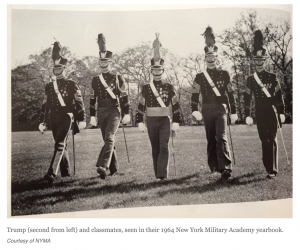Donald Trump’s lack of regard for truth during his presidential tenure, with (more than 20,000 documented lies and prevarications (Kessler et al, 2020), and behaviors that violated norms of democratic governance, are acknowledged even by his most articulate supporter, Victor Davis Hanson (Hanson, 2019). Given Trump’s crudities and claims that he doesn’t read (e.g. Graham, 2018), it is understandable that people regard Trump as ignorant – including ignorance of the history and traditions of the nation he celebrates. A Google Scholar query on the phrase “Trump ignorant”* in Nov. 2020 brought up more than 19,200 hits.
The above image is misleading. It poses the riddle of how a supposedly ignorant businessman who never held public office could manage the political and organizational feat of gaining the highest office in the United States – an achievement that has been denied to highly qualified and influential individuals of both parties. I suggest that there is good evidence that Trump was not stupid and was not poorly informed about subjects of interest to him until something like 2019. At that point successes and a gigantic ego evidently overrode over what was earlier a degree of caution and willingness to listen to people with diverse views. He began firing appointees who showed differences from his views.
“It takes a lot of smarts to play dumb – (Trump, 2008)”
An ignorant image for Trump is fundamentally misleading because Trump wanted people to believe it. In the book, Trump Never Give Up (Trump & McIver 2008, p 167 ) Trump states: “. . . it takes a lot of smarts to play dumb. Keep them off balance. Knowledge is power, so keep as much of it as you can to yourself as possible”. Appearing to show ignorance or crudity encouraged opponents and media pundits to overlook his strategies and tactics. Of especial importance, it also served to distinguish Trump from the academic, political, and media establishment in appealing to a disillusioned base.
So let’s take a factual look at Trump’s background. In the foregoing book (Trump & McIver, 2008), Trump cites a kindergarten teacher who referred to him as her most curious and questioning student. Increasing ungovernable behaviors in elementary school led father Fred Trump to move Donald to the New York Military Academy. During his five years of attendance there Trump came to thrive under imposed discipline, graduating as a cadet captain, the highest rank. It is clear that sports were his main interest. The school records show him as a star in baseball and football but also involved in soccer, bowling, and wrestling (Blair, 2005). However, he would have gained a solid secondary education including science, math, and history or he would have not been promoted to the highest rank. Following NYMA, Trump attended two years at Fordham University, a Jesuit institution where in the early 1960s, history including classics was a core requirement. While wires may have been pulled in getting him into the University of Pennsylvania’s distinguished Wharton School of Finance (Byrne, 2019), Trump would have gained a background in economics and finance, without which he would hardly have been able to gain prominence as a real estate mogul in New York City, or could seriously consider launching bids for the presidency.
Figure 1. Trump as cadet captain at New York Military Academy. Source: 1964 NYMA yearbook.
In another book (Think Like a Champion, Trump & McIver 2009) Trump cites a list of authors ranging from Pythagoras, Machiavelli, Thoreau, and Albert Schweitzer, to Bill Gates and Billy Jean King. His favorite book is the classical Chinese text, The Art of War, by Sun Tzu, which emphasizes the importance of surprise. Trump’s choices of quotations have a pattern. They tend to focus on achieving success.
The final argument against Trump being dumb is that he went from 3% in polls before he announced his candidacy for president on June 2015, to leading 16 credentialed Republican candidates one month later. His campaign operatives spanned the spectrum of Republican politics from assistants to Robert Dole to Tea Party activists. Though permanently tarnished by actions in the last two years of his presidency and brazen attempts to claim fraud in the election results of 2020, Trump is not an adversary to underrate.
REFERENCES
Blair, G. (2005). Donald Trump, Master Apprentice (2nd ed.): Simon & Schuster
Byrne, J. A. (2019, July 8). Trump Admitted To Wharton With Help From A Family Friend. Retrieved from https://poetsandquants.com/2019/07/08/trump-admitted-to-wharton-with-help-from-a-family-friend/?pq-category=business-school-news/
Graham, D. A. (2018, Jan. 5). The President Who Doesn’t Read: Trump’s allergy to the written word and his reliance on oral communication have proven liabilities in office. Atlantic Magazine, Retrieved from https://www.theatlantic.com/politics/archive/2018/01/americas-first-post-text-president/549794/
Hanson, V. D. (2019). The Case for Trump: Basic Books.
Kessler, G., Rizzo, S., & Kelly, M. (2020). Donald Trump and His Assault on Truth: The President’s Falseholds, Misleading Claims, and Flat-Out Lies: Washington Post.
Kranish, M., & Fisher, M. (2016). Trump Revealed: An American Journey of Ambition, Ego, Money, and Power: Scribner Book Company.Trump, D. J., & McIver, M. (2008 ).
Trump, D.J., & McIver. (2008). Trump Never Give Up: John Wiley & Sons
Trump, D. J., & McIver, M. (2009). Think Like a Champion: Vanguard Press.

